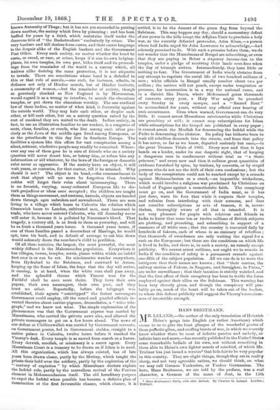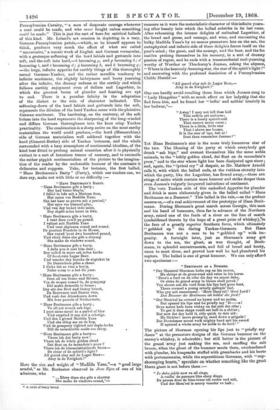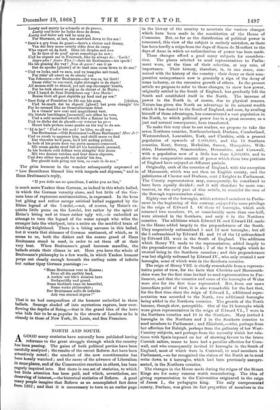HANS BREITMANN.
LELAND,—the author of the only translation of Heinrich lvi Heine's kongs into English (or rather American) which seems to us to give the least glimpse of the wonderful genius of those pathetic gibes, and scoffing bursts of woe, in which we scarcely know whether there be most of infinite passion and melody, or infinite hate and scorn,—has recently published in the United States some remarkable ballads of his own, not without something in them akin to Heine's own lighter moods of mischief, of which Mr. Triibner has just issued a version* that bids fair to be very popular in this country. They are slight things, though they are in reality sharp, and not very agreeable satires, we should think, on what we may call German Yankeeism, or Yankee Germanism. The hero, Hans Breitmann, we are told by the preface, was a real character, a German of the name of Jost, in the 15th * Hans Breitmann's Party, with other Ballads. By Charles G. Leland. London % TrlIbner.
Pennsylvanian Cavalry, "a man of desperate courage whenever a cent could be made, and who never fought unless something could be made." This is just the Bert of hero for satirical ballads of this kind. Mr. Leland's art consists in depicting in a racy, German-Pennsylvanian patois,—which, as he himself appears to think, produces very much the effect of what are called "macaronies," a mosaic work of English and German vernacular, with a grotesque softening of the bard labials and gutturals into soft, and the soft into hard,—b becoming p, and p becoming b; d becoming t, and becoming d; g becoming k, and k becoming g; —the huge, infinite appetite for earthly things of this thoroughly carnal German-Yankee, and the rather maudlin tendency to infinite sentiment, the slightly lachrymose and beery yearning after the infinite, the dreamy sadness at the earthly end which follows earthly enjoyment even of dollars and Lagerbier, in which the greatest bouts of plunder and feasting are apt to end. There is a peculiar felicity in the adaptation of the dialect to the vein of character indicated. The softening-down of the hard labials and gutturals into the soft, represents the dilution of the hard Yankee sense with the plaintive German sentiment. The hardening, on the contrary, of the soft letters into the hard represents the sharpening of the long-winded and diffuse German thoroughness into the keen crisp Yankee practicality. The combination is a sharp satire on the most earthy materialism the world could produce,—the hard (Bismarckian) side of German materialism well soldered together with the hard (General-Butler) side of Yankee 'cuteness, and the whole surrounded with a hazy atmosphere of sentimental idealism, of the kind best fitted to prolong animal sensation after it is physically extinct in a sort of luxurious trance of memory, and to reconcile the rather piggish sentimentalism of the picture to the imagina- tion of the reader by the undeniable humour of the contrasts it delineates and suggests. Take, for instance, the first ballad, "Hans Breitmann's Barty " (Party), which our readers can, we dare say, make out with little or no difficulty :—
"Hs BREITNANN'S RUM%
" Hans Breitmann gife a barty ; Dey had biano-blayin,'
I felled in lobe mit a Merican frau,
Her name vas Madilda Vane.
She hat haar as prown ash a pretzel,* Her eyes vas himmel-pluo, Und ven dey looket indo mine, Dey shplit mine heart in dwo.
"Hans Breitmann gife a barty, I vent dere you'll pe pound.
I valtzet mit Madilda Yam Und vent shpinnen round und round.
De pootiest Fraulein in de House, She vayed 'pout dwo hoondred pound, Und of cry dime she gife a shoomp She make de vindows sound.
"Hans Breitmann gife a batty, I dells you it cost him dear ; Dey rolled in more ash sefen kecka Of boost-rate Lager Beer.
Und venefer dey knocks de shpicket in De Deatschers gifes a cheer.
I clinks dat so vine a barty, Nefer coom to a het dig year.
"Hans Breitmann gife a batty ; Dote all vas Souse und Brouse, Ven de sooper corned in, de gompany Did make demselfs to house ; Dey ate das Brot und Gensy broost, De Bratwurst mid Braten vine, Und 'rash der Abendessen down Mit four parrela of Nockarwein.
"Hans Breitmann gifo a batty; Ve all cot troonk ash bigs. I poot mine moat' to a parrol of bier Und emptied it oop mit a schwigs.
Und den I gissed Madilda Vane Und she shlog me on de kop. Und do gompany vighted mit daple-lecks Dill de coonshtable made oos shtop.
"Hans Breitmann gife a barty-
Vhere ish dat barty now ! Vhere ish de lofely golden cloud
Dat float on de moundain's prow ? Vhere ish do himmelatrahlende Stern—
De sitter of de sphirit's light?
All goned afay mit de Lager Beer- Afay in de Ewigkeit !"
Here the size and weight of "Madilda Yane,"—a " good large armful," as Mr. Rochester observed in Jane Eyre of one of his admirers, who
" ...Efery dime she gife a shoomp She make de vindows sound,"—
* A twist of fancy bread.
measure as it were the materialistic character of this infinite yearn- ing after beauty into which the ballad subsides in its last verse. After rehearsing the intense delights of unlimited Lagerbier, of the bread and goose, and sausage, and wine, and recounting the bulky Madilda Yane's by no means premature box on the ear, the metaphysical and infinite side of these delights forces itself on the poet's mind ; the goose, and the sausage, and the beer, and the fat maiden prolong themselves in his memory, in a sort of dreamy passion of regret, and he ends with a transcendental soul-yearning worthy of Werther or Tbackeray's Jeames, asking the abysses, "'Where is the heavenly-beaming star, the star of the spirit's light ?"
and answering with the profound desolation of a Pennsylvanian Childe Harold :—
"All goned afay mit clo Lager Beer,— Afay in de Ewigkeit !"
One can hardly avoid recalling those lines which Jennies sang to "Lady Hangeline " with so much effect on her ladyship that she fled from him, and he found her " laffin' and sobbin' isteriely in her bedwor,"—
" Away ! I may not tell thee hall This suffrin art endures;
There is a lonely sperrit-call That sorrow never cures ; There is a little, little star That i above me beams, It is the star of 'ope, but ar ! Dost thou remember Jeames ?"
Yet Hans Breitmann's star is the more truly humorous star of the two. The likening of the party at which everybody got drunk "ash bigs," and overeat themselves like the same noble animals, to the " lofely golden cloud, dat float on de moundain's prow," and to the star whose light has been dissipated ages since ; and, again, the "lyrical cry" of despair, as Mr. Matthew Arnold calls it, with which the ballad ends, at the ruthless eternity into which the party, like the Lagerbier, has flowed away,—these are stings of satire which contain more humour and strike deeper than even Jeames's vulgarly lacquered imitations of sentiment.
The 'cute Yankee side of this embodied Appetite for plunder and drink is more elaborately given in the ballad called "Hans
Breitmann as a Bummer." This ballad is the tale,—as the preface assures us,—of a real achievement of the prototype of Hans Breit- mann. During Sherman's great march across Georgia, this man and his band of bummers, then far in advance of the Northern army, seized one of the fords of a river on the line of march • (emboldened thereto by the hope of a great prize of whiskey),%in
the face of a greatly superior Southern force, which ultimately "gobbled up" the daring Yankee-Germans. But Hans Breitmann was not a man to be "gobbled up" with im- punity. A fortnight later, just as Sherman's army got down to the sea, the ghost, as was thought, of Breit- mann, in splendid accoutrements, and full of bread and booty, came to meet them, and proved how well he had plundered his captors. The ballad is one of great humour. We can only afford two specimens :—
BILIITMANN AB A BUMBLER.
"Der Sheneral Sherman holts 00p on his coorse, He shtops at de gross-road und reins in his horse. Dere's a ford on de rifer dig day we moost dake, Or elshe de grand army in bieces shall preak !'
Von shoost ash die vord from his lips had gone bast, There coomed a young orterly gallopin' fast,
Who gry mit amazement: 'Here Shen'ral ! Goot Lord ! Dat Bummer der Breitmann ish holdin' der ford!'
"Der Shen'ral he ootered no hymn und no psalm, But opened his lips und he priefly say'D—n! Dere moost hafe been viskey on dat side der rifer ; To get it dose shape vould set hell in a shiver; But now dat dey hold it, ride quick to deir aid : Ho Sickles! move promp'ly, send down a prigade ! Dat Dootchman moost vork mighty hard mit his sword
If againsd a whole army he holds to de ford.'" The picture of Sherman opening his lips just to " priefly say" damn" at the premature designs of the German bummer on the enemy's whiskey, is admirable ; but still better is the picture of the grand 'army just making the sea, and snuffing the salt breeze, when the ghost of the bummer meets them, overburdened with plunder, his knapsacks stuffed with greenbacks and his boots with portemonnaies, while the superstitious Germans, with " oop- sboomping hearts," speculate on whether something like the great Hartz giant is not before them :— " In duke jubilo now ye all sings,
A-vailin' de panners like efery dings. De preeze droo de bine-trees ish cooler und salt, Und for Shen'ral is merry venefer ve halt ; Loosty und merry he schmells at do preez:,
Lustig end heiter he looks droo de drees, Lustig und heiter ash veil he may pe,
For Sherman, at last, has marched down to the sea!
Dere's a gry from de guart—dere's a dotter und dramp, Von dat fery same orterly rides droo de camp
Who report on da ford. Dora ish droples and awe
In de face of de youf' apout soundings he saw ; Und he shpeak me in Fra3ntsch, like he always do : Look !
Sagre pleu! fentre Tieu !--dere ish Breitmann—his spook ! He iah goming dis 'ray! Nom de garce ! can it pa
Dat de spooks [ghosts] of de tead men coom down to de sea!'
Und ye looks, und vs sees, und ye tramples mit tread,
For risin' all swart on de efenin' red Vu Johannes—der Breitmann—der was es, bei Gott!
Coom ridin' to oos-vard, right shtraight to de shpot !
All mouse-still ve shtood, yet mit oop-shoompin' hearts, For he look shoost so pig as de shiant of de Hartz; Una I heard de Sout Doutschers say 'Ave Morie !
Braise Gott all goot shpirids py land und py sea!'
'Boot Itzig of Frankfort he lift oop his nose, [clothes, Und be-mark dat he shpook [ghost] hat peen changin' his For he seemed like an Generalissimo drest
In a vlamin' new coat mid magnificent vest.
Six bistols beschlagen [mounted] mit saber he yore, Und a cold mounded swordt like a Kaisar he bore, Und ye dinks dat de ghosdt—or votever he pe- Moost hafe proken some panks on his vay to de sea.
"'Id is he!' 'Under er lebt noch! he lifes, ye all say : Der Breitmann—Oldt Breitmann !—Hans Breitmann! Herr Te!'
Und ye roosh to emprace him, nod shtill more ve find Dat vherefer he'd peen, he'd left noding pehind.
In bofe of his poots dare vas porte-moneys crammed, Mit croon-packs stool fall all his haversack jammed, In his bockets cold dollars vere shinglin' deir dooms Mit two doozen vetches und four dozen shpoons, Und dwo silber tea-pods for makin' his dea,
Der ghosdt hafe pring mit him, en route to de sea."
The grim humour in the wonder subsequently expressed at "how Brovidence blessed him with teapods and shpoons," and in Hans Breitmann's reply,
"If you dells me no quesdions, I ashks you no lies,"
is much more Yankee than German, as indeed is this whole ballad, in which the German voracity alone, and but little of the Ger- man haze of rapturous sentimentalism, is expressed. In the keen but gibing and rather savage satirical ballad suggested by the Rhine legend of the Lorelei,—not, of course, by Heine's ex- quisite little poem on the Lorelei, but rather by the spirit of Heine's biting and at times rather ugly wit,—is embodied an attempt to turn the legend of the water nymph who wiles the stranger into the whirlpool, into a satire on the muddled brain of drinking knighthood. There is a biting sarcasm in this ballad, but it wants that shimmer of German sentiment, of which, as it seems to us, both the dialect and the coarse greed of Hans Breitmann stand in need, in order to set them off at their very best. When Breitmann's greed becomes maudlin, the ballads attain their climax in art. Here you have the whole of Breitmann's philosophy in a few words, in which Yankee humour peeps out clearly enough beneath the curling mists of infinite but rather tipsy German yearnings :—
" Hans Breitmann vent to Kansas ; Droo all dis earthly land,
A vorkin' out life's mission here Soobyectilly und grand.
Some beoblesh runs de beautiful, Some vorks philosophie ; Der Breitmann sotto de infinide Ash von eternal shpree !"
That is no bad compendium of the humour embodied in these ballads. Sausage shaded off into mysterious rapture, beer over- flowing the depths of Being,—that is the grand idea of the hero
who bids fair to be as popular in the streets of London as he is already in those of New York, St. Louis, and San Francisco.
al








































 Previous page
Previous page